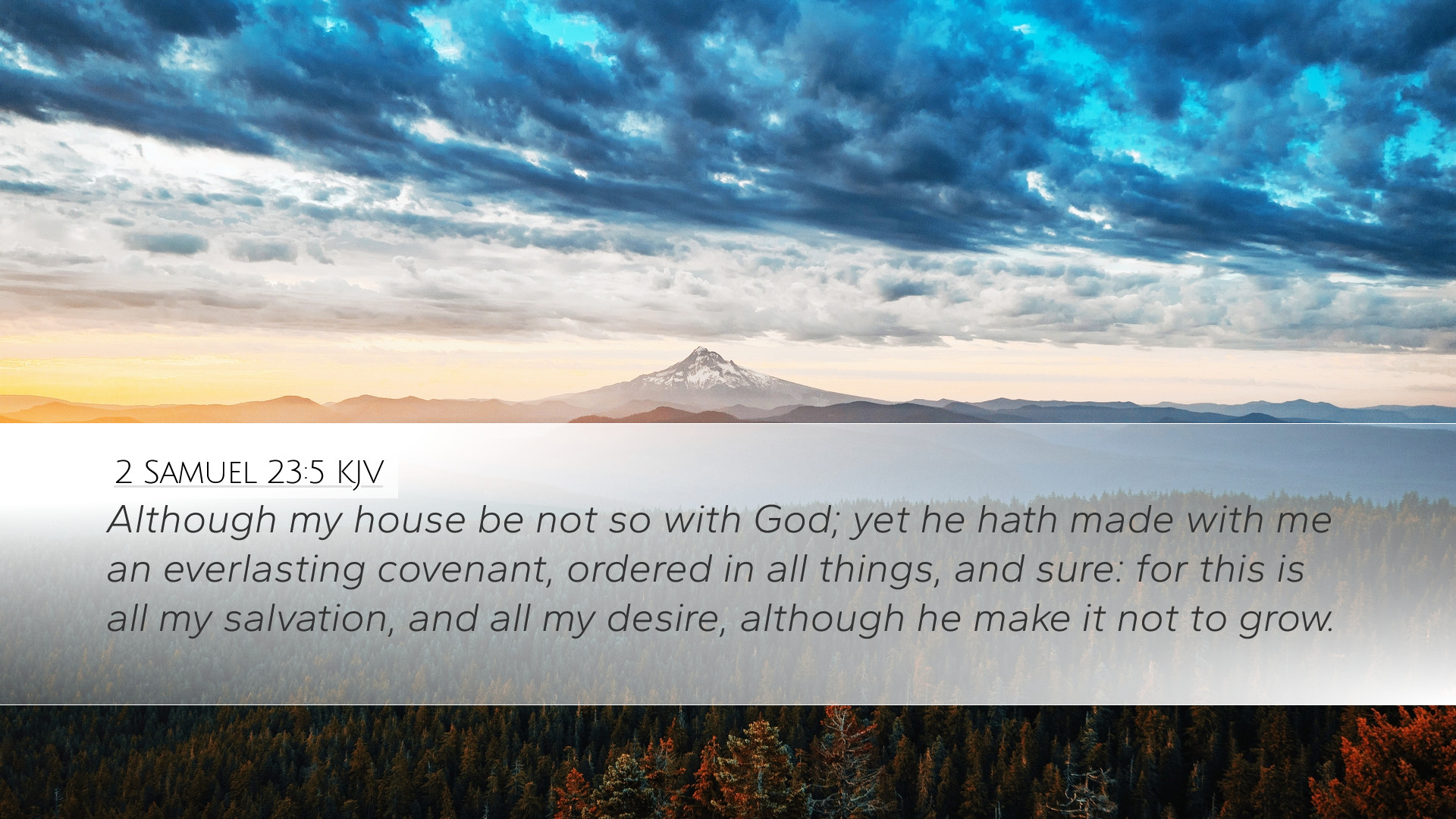Commentary on 2 Samuel 23:5
Verse Text: "Although my house be not so with God; yet he hath made with me an everlasting covenant, ordered in all things, and sure: for this is all my salvation, and all my desire, although he make it not to grow."
This verse, spoken by David in his last words, encapsulates profound theological truths about God's covenant and the nature of salvation. It deals with the issues of divine faithfulness amidst human frailty, and the eternal significance of God's promises.
1. The Context of David’s Statement
David reflects on his life and the covenant between him and God, acknowledging the disarray of his household. This statement is not merely a personal confession; it is a doctrinal assertion about the character of God and His promises.
1.1 The Covenant of God
The covenant established with David is emphasized in this verse. Importantly, he notes that despite the failures of his household, God's commitment remains steadfast. Matthew Henry comments, "David found that though his house was not as it ought to be, God's covenant was still in place."
1.2 A Personal Acknowledgment
David acknowledges the contrast between his household's failings and God’s unchanging nature. Albert Barnes explains that “David speaks to reassure himself of the faithfulness of God even when he sees shortcomings in his lineage.”
2. The Nature of God’s Covenant
The nature of God’s covenant, as understood within Scripture, is crucial for understanding this verse. David describes the covenant as “everlasting,” meaning it transcends human failure and time.
2.1 Efficacy of the Covenant
Adam Clarke elaborates that “the everlasting covenant signifies that regardless of what happens, God’s promises continue to be true.” The assurance found in God's commitment is essential for believers, particularly leaders who may experience despair due to circumstances beyond their control.
2.2 Covenant and Salvation
This verse emphasizes that the covenant is integral to salvation: “for this is all my salvation, and all my desire.” David's expression highlights the exclusivity of God's covenant—salvation is ultimately found in Him alone.
3. Theological Implications
The implications of this verse are significant for contemporary believers, offering rich insights into divine grace, the nature of human failure, and the assurance of salvation.
3.1 Assurance in Divine Promise
Despite his household's shortcomings, David’s reliance on God's promise provides a model for faith. Henry mentions, “It is a great comfort to observe how David clung to the assurances given to him by God.” This reassurance can offer hope to pastors and believers grappling with personal or communal failings.
3.2 Hope Amidst Human Failure
Importantly, David recognizes that God's plan is not thwarted by human actions. Clarke notes, “David’s faith transcends the immediate realities of his lineage, indicating that God’s plans will ultimately prevail.” This idea resonates deeply in the lives of modern believers facing societal or family struggles.
4. Conclusion
In conclusion, 2 Samuel 23:5 is a proclamation of faith despite acknowledged failings. The commitment of God to His people, illustrated through the everlasting covenant, offers hope and assurance. Both students and scholars must recognize the richness of this passage, as it underlines the interplay between divine promise and human limitations.
4.1 Call to Action
Pastors and theologians are encouraged to share these insights with their congregations, emphasizing that while families and communities may falter, God’s enduring covenant remains a source of hope and comfort.


